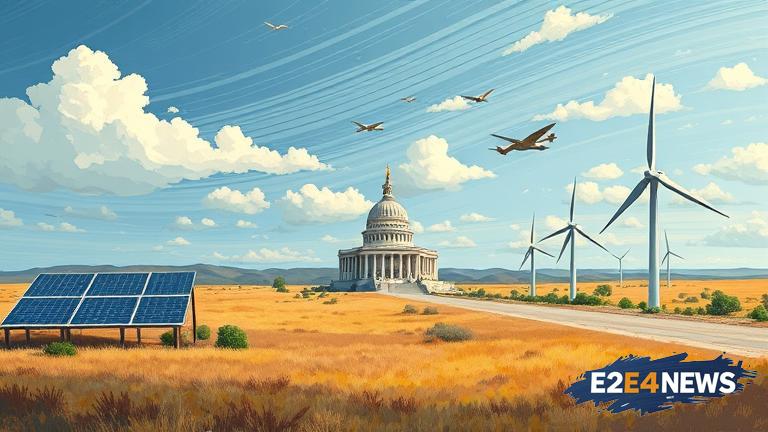The US Interior Department has been using environmental laws to suppress the development of renewable energy projects, a move that has sparked intense controversy and debate among industry experts and environmentalists. This approach has been met with criticism from renewable energy advocates, who argue that it undermines the country’s transition to cleaner energy sources. The Interior Department’s actions have been seen as a major setback for the renewable energy industry, which has been growing rapidly in recent years. Despite the growing demand for renewable energy, the Interior Department has been using laws such as the National Environmental Policy Act (NEPA) to slow down or block the development of new projects. NEPA requires federal agencies to conduct thorough environmental assessments before approving new projects, which can be a lengthy and costly process. The Interior Department has been using this law to delay or reject renewable energy projects, citing concerns over potential environmental impacts. However, critics argue that the department is misusing NEPA to stifle the growth of renewable energy. The use of environmental laws to suppress renewable energy development is not only hindering the transition to cleaner energy sources but also undermining the country’s efforts to reduce greenhouse gas emissions. The Interior Department’s actions have been seen as a major obstacle to the development of large-scale renewable energy projects, such as wind and solar farms. These projects require significant investments and can take years to develop, but the Interior Department’s use of environmental laws is making it difficult for companies to secure the necessary permits and approvals. The renewable energy industry has been growing rapidly in recent years, with solar and wind energy becoming increasingly cost-competitive with fossil fuels. However, the Interior Department’s actions threaten to undermine this progress and hinder the country’s transition to a low-carbon economy. The use of environmental laws to suppress renewable energy development is also having a disproportionate impact on rural communities, which are often the locations of large-scale renewable energy projects. These communities are missing out on the economic benefits of renewable energy development, including job creation and tax revenue. The Interior Department’s actions have been met with criticism from lawmakers, who argue that the department is overstepping its authority and undermining the country’s energy policy. The department’s use of environmental laws to suppress renewable energy development is also being challenged in court, with several lawsuits filed against the agency. The outcome of these lawsuits will have significant implications for the renewable energy industry and the country’s transition to a low-carbon economy. In conclusion, the Interior Department’s use of environmental laws to suppress renewable energy development is a major setback for the industry and the country’s efforts to reduce greenhouse gas emissions. The department’s actions are being met with criticism from industry experts, environmentalists, and lawmakers, and are being challenged in court. As the country continues to transition to a low-carbon economy, it is essential that the Interior Department’s actions are aligned with the country’s energy policy and do not undermine the growth of renewable energy. The development of renewable energy projects is crucial for reducing greenhouse gas emissions and mitigating the impacts of climate change. The Interior Department’s use of environmental laws to suppress renewable energy development is a step in the wrong direction and must be addressed. The country needs to find a balance between protecting the environment and promoting the development of renewable energy. The Interior Department’s actions are not only hindering the growth of renewable energy but also undermining the country’s efforts to reduce its reliance on fossil fuels. The use of environmental laws to suppress renewable energy development is a complex issue that requires a nuanced approach. The Interior Department must work with industry experts, environmentalists, and lawmakers to find a solution that balances the need to protect the environment with the need to promote the development of renewable energy. The country’s transition to a low-carbon economy depends on it.
